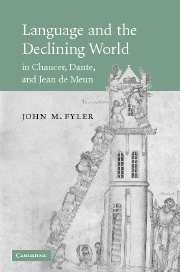4 - The prison-house of language
Published online by Cambridge University Press: 13 January 2010
Summary
THE DECAY OF LANGUAGE: SECOND NUN TO CANON'S YEOMAN
“Back out of all this now too much for us, / Back in a time made simple by the loss/ Of detail …” Robert Frost's half-ironic “Directive” to an unclouded past sums up the confusions of our complicated present in the tangled syntax of its first line; but the second implies the potential self-delusion in our universal impulse to nostalgia, since the “loss of detail” is evidently as much in our wishful perceptions as in the erosions worked by time. (As Randall Jarrell observed, “The people who live in a Golden Age usually go around complaining how yellow everything looks.”) These two impulses – playing with language to define historical process, and exploring the sentimental or potentially self-serving motives in nostalgia – are topics of central importance in the Canterbury Tales. The sentimental or self-serving are particularly evident in the sequence of tales most concerned with Paradise, the Golden Age, rhetoric, and style: Clerk, Merchant, Squire, and Franklin. The clearest because most extreme presentation of the first of these impulses, defining historical process, comes later, in the Second Nun's Tale and Canon's Yeoman's Tale.
The relationship of the declining world, language, and rhetoric is – as earlier chapters in this book have shown – the subject of a great deal of discussion in both classical and Christian writers.
- Type
- Chapter
- Information
- Publisher: Cambridge University PressPrint publication year: 2007



